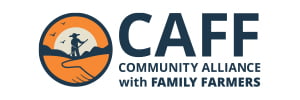
The Community Alliance with Family Farms (CAFF) held a Biologically Integrated Orchard System (BIOS) field day at Chinchiolo Farms on April 20th. After a very wet winter, attendees enjoyed the nice weather as they gathered in the orchard to discuss a novel mower prototype, pruning, and nematode management.
Emily Ayala, CAFF’s Ecological Farming Program Manager, kicked off the event by introducing CAFF and highlighting CAFF’s many different program areas. Hanna Kahl, CAFF’s Ecological Pest Management Program Specialist, highlighted the EPM Program and the BIOS project, as well as future projects focused on spider mite management and fallow land management.

After the intro, farmer and host, James Chinchiolo, shared the history of his family’s farm that he manages with his father, Tom Chinchiolo. James is a fourth generation farmer, and is dedicated to his mission to “provide people the opportunity to develop an intimate relationship with modern agriculture.” In addition to his walnut orchard, he also farms a cherry orchard in Lodi where he has built up a direct-to-consumer market with U-pick events and farm tours. He touched on his future plans to establish an U-pick apple orchard, install drip-lines to improve irrigation and nutrient management, and create a composting system using walnut husks and orchard waste.
The group then moved out to orchard, where James demonstrated his custom mower prototype which includes a flail mower, blower, and weed sprayer hitch. James worked in collaboration with Vrismo and Valley Tool Manufacturing to build this tool so he could combine orchard sanitation, mowing, and weed management in one pass. Orchard sanitation is a key management practice for controlling navel orangeworm, a major walnut pest that overwinters inside the leftover, or mummy, nuts. In order to disrupt that cycle and decrease the NOW population for the upcoming year, it is recommended to remove mummy nuts from trees, and then blow them out of the berms into the windrow so they can be shredded and destroyed with a mower. James wanted to develop this tool to increase efficiency while minimizing the impact that many passes with heavy machinery can have on soil compaction. The attendees then got to observe the mower in action as James mowed down a cover crop strip.
After the demo, James spoke to some other issues he is facing in his orchard. He highlighted a block that suffers from nematodes and crown gall, resulting in stunted tree growth and reduced yields. He reflected that his minimal pruning technique might have actually exacerbated these problems, since the young trees did not grow quickly enough to keep ahead of nematodes and other pest problems. He has had more success in a newer block where he planted from pots, grafted in the orchard, and then pruned conventionally by tipping the ends to encourage more growth.

In continuing this conversation, Dr. Becky Westerdahl, from the UC Davis Dept. of Entomology and Nematology, spoke to the group about the common nematode pests of walnuts, their behaviors and life cycles, and how to manage them with proper rootstock selection, bionematicides, and fumigants. She highlighted that nematode management is complicated since certain methods can increase nut yields while also increasing nematode populations. In addition, certain cultural methods like cover cropping can have varied results depending on plant species and proper incorporation into the soil. Fumigation efficacy is dependent on soil moisture levels and the depth of penetration. Dr. Westerdahl stressed that there is no silver bullet treatment for nematodes, and that it is more important to promote vigorous and healthy trees that can produce well even in the presence of nematodes.

The presentation sparked a discussion on whether these problems are not caused solely by pests and pathogens, but are also symptoms of the land hitting its carrying capacity. This is part of why James wants to diversify his crops and his markets in order to work with, instead of against, the limits of the land. It also highlighted the importance of regenerative practices that improve the health of the whole system to sustain and improve the capacity of the land for future generations.
This field day at Chinchiolo Farms gave everyone the opportunity to enjoy the nice weather and discuss how to efficiently farm while reducing negative environmental impacts such as soil compaction and pesticide sprays.
Further learnings:
Listen to James Chinchiolo talk about the event in an interview with My Ag Life Daily News Podcast (starting at timestamp 6:58).
Learn more about Chinchiolo Farms and their cherry U-Pick at www.chinchiolofarming.com
Learn more about CAFF’s Ecological Farming Program at www.caff.org/ecologicalfarming

